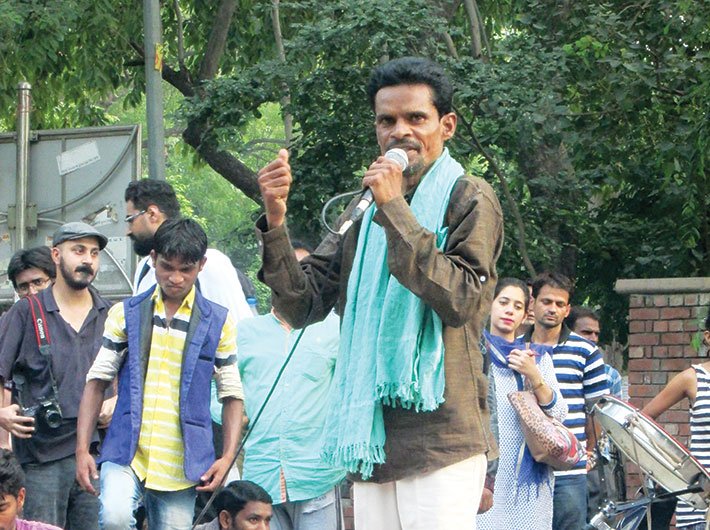As caste-based protests take centre stage across the country, a dalit from Chhattisgarh is singing a different tune
At first glance, he looks like a timid and harmless man. The moment you start talking to him, his confident and energetic voice is in stark contrast to his frail frame. And as soon as he starts singing, the audience becomes his fan, and cheers louder at every pause. Meet Kaladas Deheriya from Chhattisgarh who has been enthralling people with his protest music for years. This year, he performed at an event outside the Faculty of Arts in the University of Delhi. Wearing a deep brown shirt and a green gamchha around his neck, Kaladas sang verses voicing anger against poverty, inequality and corruption. The young crowd was captivated by his powerful voice.
Kaladas has been singing protest songs since he was in class 5. Coming from a family of dalit daily-wage labourers in a village near Bhilai, he faced caste-based seclusion and atrocities at every step. Angry at the way upper-caste people used to treat those from the lower caste in his village, Kaladas channelised his frustration by penning songs and poems around these themes. The seeds of rebellion were thus sown quite early and the medium he chose for his agitation was music.
But why songs? “I can do better with this medium. I was always inclined towards it since childhood. By the medium of songs and nukkad natak [street play] I can do something for society,” he says.
For over two decades Kaladas has been associated with the Chhattisgarh Mukti Morcha (CMM) – a political party for the upliftment of workers and farmers. He has been campaigning actively across the state and in different parts of the country for the cause of the poor. “We do not believe in caste. We just believe in samajwad [socialism]. A punjiwadi [capitalist] would never like to see a mazdoor [worker] rise above him. We consider dalits and others as our people, our comrades.”
With ghunghroos tied to his hands and feet, and singing songs that evoke the daily toil and travails of the oppressed classes, Kaladas has been able to reach out to lakhs of people. “When I sing people feel connected with me. They say that my songs are about their own experiences. They get very close to us and our movement,” says the man who is in his fifties.
After completing class 11, Kaladas took up a job with the public works department near his village. He had to leave that job just after five months as his employers were forcing him to forge some documents. “There was a dire situation in my home at that time. We had nothing to eat. I left my village to search for a job,” he says.
In 1990, he got a job at an industrialist’s house in Bhilai. “Working there as a gardener I used to get mere 75 paise per day. He did not give me food. I had no place to stay and used to sleep on the streets,” he recalls. At the end of the year, he came to know about a vacancy in a factory in Raipur. Having no money in hand, Kaladas walked 35-40 km to Raipur in search of a better job. But destiny played a cruel joke. He was offered a job to clean toilets in the factory. “Since I had no work I grabbed the offer. I used to get only Rs 500 a month. I protested the meagre salary but to no avail.” Working there, Kaladas also got acquainted with the harsh realities of factory work: low wages, over burden of work, and inhumane working conditions.
The turning point came in 1991, when legendary leader and founder of CMM Shankar Guha Niyogi intensified his campaign against the plight of factory workers. Kaladas saw CMM activists marching on the streets of Raipur, waving red and green flags. Intrigued by the scenes he went to Niyogi’s office. “Niyogiji told me about his movement and asked me how I can contribute. I told him I can just sing. I quickly made a song for him, ‘Ladbo, shoshan ke khilaaf ladbo’ [Fight, fight against exploitation].” Impressed by his unique style, Niyogi urged him to join CMM and write such protest songs – an offer which he readily accepted.
“Niyogiji advised two things when he inducted me into the CMM: never to betray the organisation and not to take drugs. He even gave me Rs 100 to buy new clothes, since I was wearing torn ones. I have devoted my whole life since then to the cause of the movement.”
Thus, as India embarked on economic liberalisation, Kaladas found a new path to channelise both his anger and passion for music after years of directionless angst.
What was the one thing that impressed him the most about the revolutionary leader? “When I went to see him, Niyogiji first offered me food and then asked me to rest. He listened to my problem only the next morning. This is how he treated all visitors. Only after their stomachs were full would he listen to their problems and advise them.”
Shankar Guha Niyogi was shot dead on September 28, 1991. “It was a big shock for me. But I stayed strong, followed his advice and gave my full support to the organisation.”
During 1993-95, Kaladas organised rallies and received massive support from people. Since then he has joined various groups and unions fighting inequality. Keeping up with the times, he has also been using technology extensively to bring his protest music to the mainstream. Most of his songs are uploaded on YouTube.
However, like every revolution his has also seen some setbacks. Recalling one such incident, Kaladas says, “In 1993-94 we were once performing in Delhi. Trade union workers from all over the country had gathered. When I started singing there was a sudden lathi charge by police. I was jailed but was released on bail soon. In fact, I have been jailed 20 times. But that has never destroyed my spirit. It has made me more determined.”
So what are his future plans? And does his family support his mission? “I give 24 hours to the cause. My wife and children [a daughter and a son] are also active with the movement.”
Kaladas obviously has no source of income and is completely dependent on the organisation. “Sometimes I get food from the sangathan. There are times when we get to eat vegetables only once a week. Even my clothes are donated by the party workers.”
Though the CMM has substantial support in Chhattisgarh and other states, there is still a long way to go. “We want more people to join us but sarkar [the government] has trapped us in things like brahminism, caste and class. It is very hard to break this trap but we are still trying.”
In times like these, Kaladas’s peaceful way of protest might seem unique, yet he believes that a “jhujaru” [persistent or spirited] agitation is also needed to bring about a change in society. “It is often said that one day people will unite to fight for the cause. But when will that time come? Who will bring that time? We cannot wait, we have to decide now and fight together.”
And who will fight this fight? “People often say that every child should be like Bhagat Singh. But they want their children to become engineers or doctors. As a result it is always a poor man’s son who goes on to become a Bhagat Singh or a Shankar Guha Niyogi. Why? Can we march forward with this attitude?”
ridhima@governancenow.com
(The article appears in November 16-30, 2016 edition of Governance Now)

